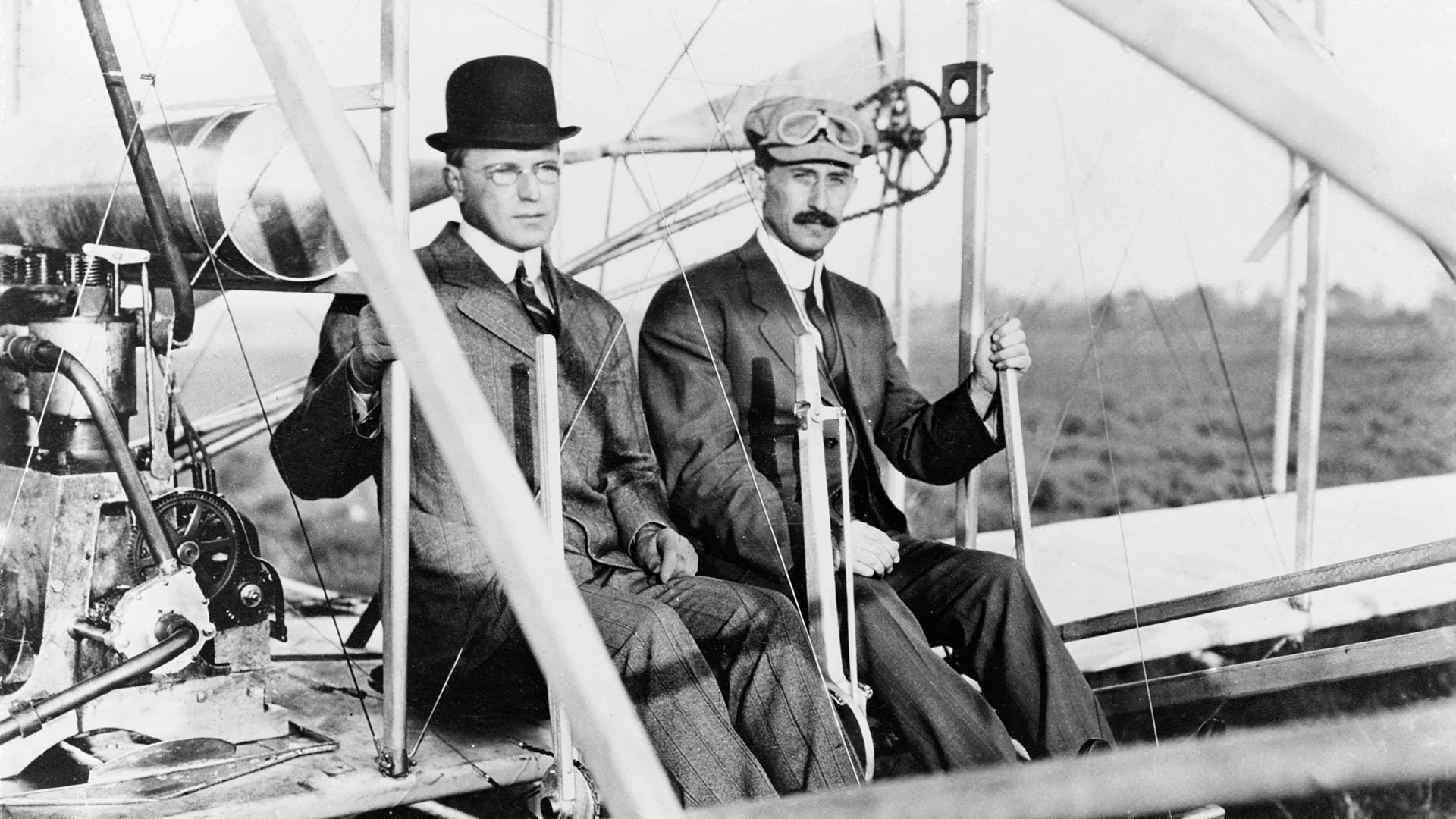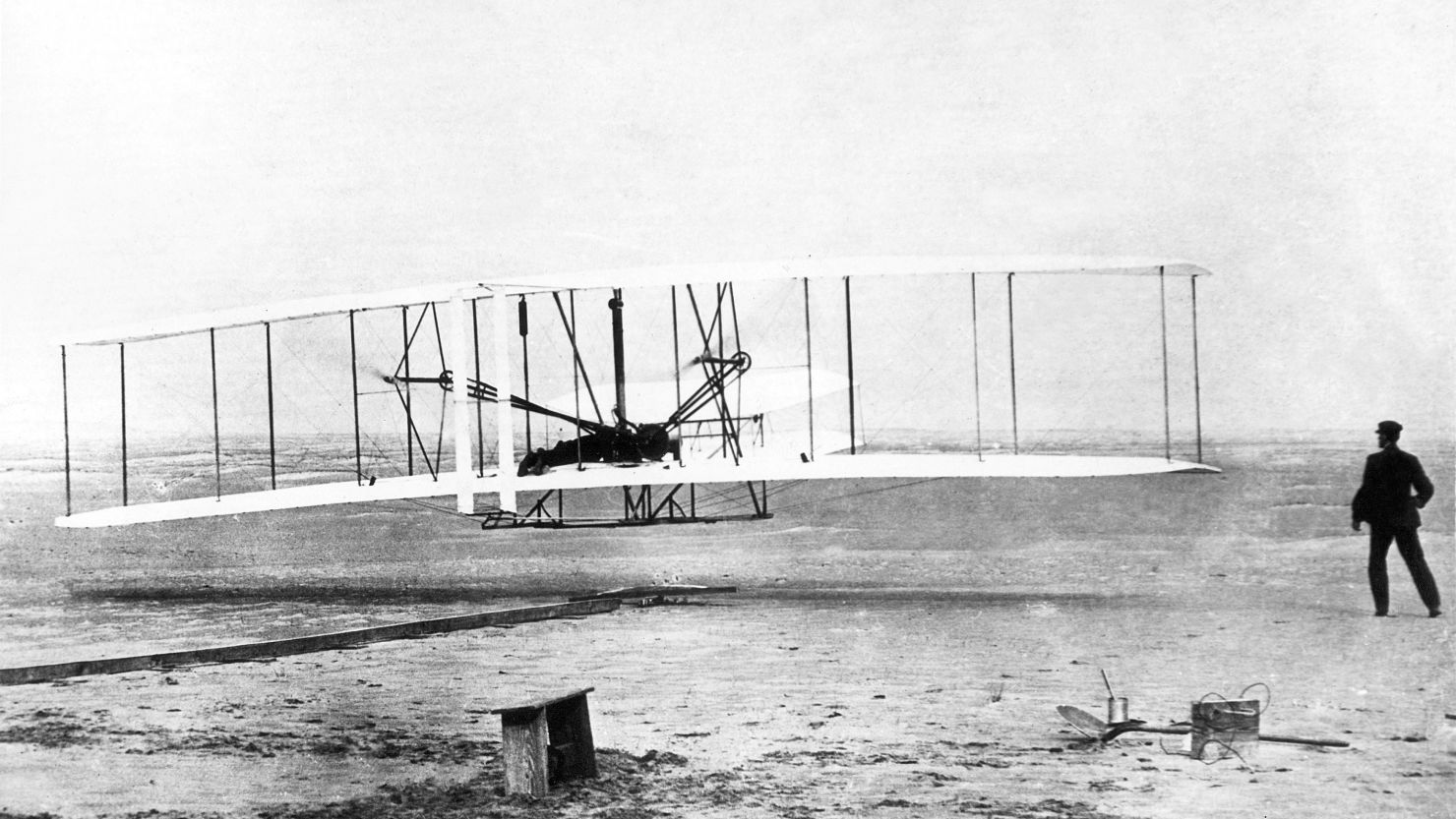The Wright Brothers

Wilbur and Orville Wright standing proudly with their aircraft at Kitty Hawk
Biography
Wilbur and Orville Wright were two ordinary boys with an extraordinary curiosity. Born in the Midwest, they grew up in a home that treasured books, creativity, and mechanical tinkering. Their father, a bishop, often brought them small gifts from his travels. One of these—a tiny toy helicopter powered by rubber bands—sparked something that would define their lives. It was simple, delicate, and magical. When it lifted into the air, it lifted their imaginations too. From that moment, the idea of human flight became their shared obsession.
As young men, the brothers opened a bicycle shop in Dayton, Ohio. It was a perfect training ground for inventors. They repaired gears, built frames, and learned how to balance precision with practicality. But when work was done, they turned their attention skyward. Without formal degrees or fancy laboratories, they taught themselves aeronautical engineering by reading, observing, and experimenting. They built their own wind tunnel to test wing designs, carefully studied how birds soared and glided, and developed theories that challenged the accepted science of the time. They believed that control—being able to steer and stabilize—was the true key to flight, not just power.
Their breakthrough came on December 17, 1903, on the sandy dunes of Kitty Hawk, North Carolina. With bitter wind stinging their faces, Orville climbed aboard a small wooden flyer powered by a simple engine. It rose into the air and stayed aloft for 59 seconds. It may not sound like much today, but in that single minute, the impossible became possible. Humanity had flown. Yet their success was met with skepticism. Many scientists and newspapers doubted their claims. The Wright brothers had to prove themselves again and again, giving flight demonstrations for the U.S. Army and European audiences who watched in disbelief as they circled above their heads.
Behind their invention were two very different but perfectly matched minds. Wilbur Wright was calm, methodical, and deeply thoughtful. He was an avid reader and writer, a man who thought before he spoke and worked quietly with precision. His path might have led him to Yale and a career in education if not for an accident in his teens that left him injured and isolated. During his long recovery, Wilbur devoted himself to study and reflection, developing the patience and discipline that later defined his engineering work.
Orville Wright, four years younger, was more impulsive and playful. He loved to build things, take them apart, and improve them. He was curious and daring, the kind of mind that always asked “what if.” While Wilbur crafted theories, Orville brought them to life with his hands. Together, they balanced each other—logic and intuition, precision and passion. Although Orville never finished high school, his self-education through experimentation and independent study was as deep and wide as any college degree.
Their partnership turned a dream into a revolution. By 1910, they had formed the Wright Company to manufacture airplanes. But their invention brought challenges as well as triumphs. Competing inventors copied their designs, leading to endless patent disputes. Wilbur, the brother who thrived on discipline and duty, shouldered most of the legal and business burdens. The stress took its toll. In 1912, at the age of 45, Wilbur died of typhoid fever, leaving Orville to carry on alone.
Orville continued to refine their designs, advise aviation leaders, and defend their legacy. Although flying eventually became painful for him due to old injuries, he remained a respected voice in science and policy until his death in 1948. Over his lifetime, he received numerous medals and honorary degrees, yet he remained humble—always crediting the work he and Wilbur did together.
The Wright brothers’ story is not just about flight. It is about persistence, imagination, and belief in one’s own ideas. They showed the world that two self-taught inventors could achieve what great institutions could not. They taught us that progress begins with curiosity, that failure is simply part of learning, and that the power of partnership can lift human dreams higher than the sky itself. More than a century later, every airplane that takes off is a living reminder of their courage. The world is smaller because they dared to make it larger.
?
How did the Wright brothers’ background in bicycles help them design the first airplane?
What was the significance of Kitty Hawk, North Carolina, in aviation history?
Why did the Wright brothers face so much skepticism from the public and scientific community?
What role did wind tunnel testing play in their breakthroughs?
How did Wilbur and Orville complement each other as collaborators?
What were some of the legal and business challenges they faced after their invention?
How did the Wright brothers’ invention change the world?
Dig Deeper
Wilbur Wright was born on April 16, 1867, Millville, Indiana and Orville Wright was born on August 19, 1871, Dayton, Ohio. Both brothers were pioneers credited with inventing the first airplane.
Discover more
Further Reading
Stay curious!



